
Birbal Sahni FRS was an Indian paleobotanist who studied the fossils of the Indian subcontinent. He also took an interest in geology and archaeology. He founded what is now the Birbal Sahni Institute of Palaeobotany at Lucknow in 1946. His major contributions were in the study of the fossil plants of India and in plant evolution. He was also involved in the establishment of Indian science education and served as the President of the National Academy of Sciences, India and as an Honorary President of the International Botanical Congress, Stockholm.

Epiprinus is a genus of plant of the family Euphorbiaceae first described as a genus in 1854. It is native to Indochina, Sumatra, southern China, and the Indian Subcontinent.
- Epiprinus balansae(Pax & K.Hoffm.) Gagnep. - Vietnam
- Epiprinus lanceifoliusCroizat - Vietnam
- Epiprinus malayanusGriff. - Myanmar, Thailand, Peninsular Malaysia, Sumatra
- Epiprinus mallotiformis(Müll.Arg.) Croizat - southern India
- Epiprinus poilaneiGagnep. - Vietnam
- Epiprinus siletianus(Baill.) Croizat - Hainan, Yunnan, Assam, Laos, Myanmar, Thailand, Vietnam

The bronze grass skink, bronze mabuya or speckled forest skink, is a species of skink found in South and Southeast Asia. It is a common, but shy, ground-dwelling species that is active both day and night.

Staurogyne is a genus of plants in the family Acanthaceae.
Ablepharus sikimmensis is a species of skink found in Bangladesh (Rangpur), Bhutan, China (Tibet), India and Nepal.
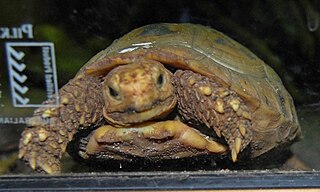
Indotestudo is a genus of tortoises in the family Testudinidae. The genus is native to South and Southeast Asia. The three species in the genus are all threatened.
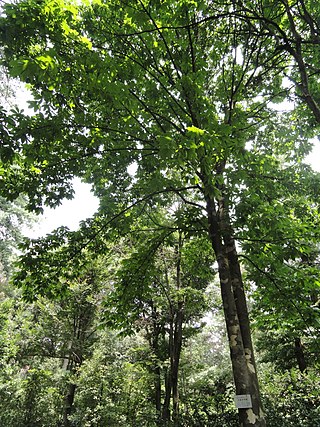
Aesculus wangii is a species of tree in the family Sapindaceae, found in southern China (Yunnan) and northern Vietnam. It is threatened by habitat loss. Sometimes considered conspecific with Aesculus assamica.

Rhaphidophora is a genus in the family Araceae, occurring from tropical Africa eastwards through Malesia and Australasia to the Western Pacific. The genus consists of approximately 100 species.
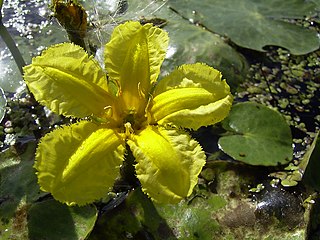
Nymphoides peltata is perennial, rooted aquatic plant with floating leaves of the family Menyanthaceae.
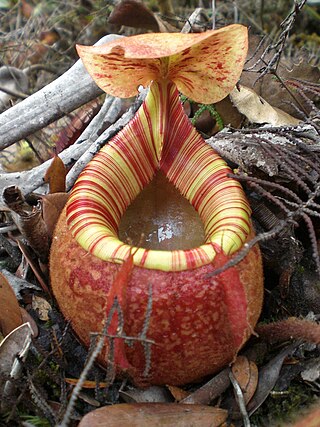
Nepenthes peltata is a tropical pitcher plant known only from the upper slopes of Mount Hamiguitan on the island of Mindanao in the Philippines. It is characterised by a peltate tendril attachment and conspicuous indumentum. The species typically produces ovoid pitchers with a prominent basal crest and large nectar glands on the lower surface of the lid.
Sipmania is a genus of lichenized fungi within the order Arthoniales. The genus has been placed into the family Roccellaceae. This is a monotypic genus, containing the single species Sipmania peltata.
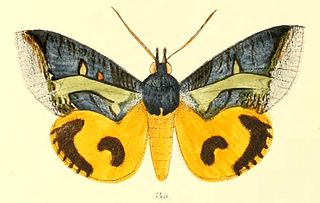
Eudocima homaena is a moth of the family Erebidae first described by Jacob Hübner in 1816. It is found in the Indian subregion, Sri Lanka, Myanmar, Taiwan, the Nicobars, Peninsular Malaysia, Borneo, the Philippines and on Christmas Island. It is a major pest on orange plants.
Colquhounia elegans is a shrub species in the genus Colquhounia found in Asia.
- Colquhounia elegans var. elegans - Yunnan, Cambodia, Laos, Myanmar, Thailand, Vietnam
- Colquhounia elegans var. tenuiflora(Hook.f.) Prain - Yunnan, Cambodia, Laos, Myanmar, Thailand, Vietnam

The New York City Board of Transportation or the Board of Transportation of the City of New York was a city transit commission and operator in New York City, consisting of three members appointed by the mayor. It was created in 1924 to control city-owned and operated public transportation service within the New York City Transit System. The agency oversaw the construction and operation of the municipal Independent Subway System (IND), which was constructed shortly after the Board was chartered. The BOT later presided over the major transfers of public transit from private control to municipal control that took place in the 1940s, including the unification of the New York City Subway in 1940. In 1953, the Board was dissolved and replaced by the state-operated New York City Transit Authority, now part of the Metropolitan Transportation Authority (MTA).

Nephroia orbiculata, the queen coralbead, is a species of woody vines. It is found from India east to Java.
Cyclea elegans is a species of flowering plants in the family Menispermaceae. It is found in Sumatra, Malaya, Borneo. An isotype is kept at Kew Gardens Herbarium. It was collected on Mount Kinabalu Dallas.

Tetramicra canaliculata is a species of orchids in the subtribe Laeliinae. It is found in Florida, Hispaniola, Puerto Rico, Trinidad and the Lesser Antilles. It is the type species of its genus.
Yushania elegans is a species of bamboo. It is found in India and Indo-China.
Lappa was an ancient city in Crete. It was located near modern Argyroupoli.
Stauntonia filamentosa is a plant in the family Lardizabalaceae.














